Special Feature 2021 - Integrated Report 2021
Human Resources
Retain and develop diverse talent
Maintain and foster globally competitive human resources
Basic stance
In order to achieve consolidated net sales of 10 trillion yen in FY2030 and realize the Vision to become a global company that grows sustainably for the next 100 years and beyond and the world’s leading solution-providing business group that solves numerous problems for the people of the world, the Nidec Group believes that it is crucial to maintain and foster globally competitive human resources, in other words, human resources capable of working globally. We define those who have high abilities in the 3P attitudes (Proactive, Productive, Professional), problem solving, and cross-cultural communication as global human resources, and foster such human resources at the Global Training Center, which is Nidec’s human resources development base. Nidec currently focuses on talent management aimed at identifying and developing talented human resources, including local personnel at overseas sites and Group companies in Japan. We plan to introduce a talent management system for the integrated management of talented human resources. Furthermore, to create human resources who will be motivated to play an active role in achieving the target of 10 trillion yen of consolidated net sales in FY2030, we are determined to implement various measures to maintain and foster globally competitive human resources, including introducing a new personnel system based on global standards to properly evaluate the work results.
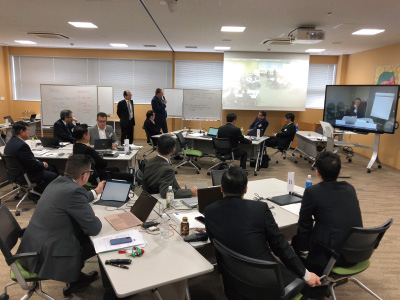
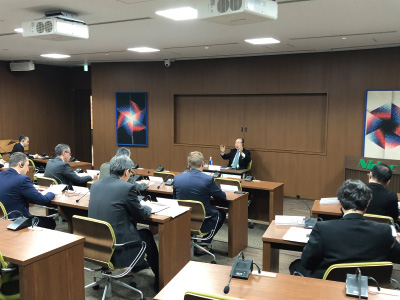
Developing global human resources
Aiming to develop human resources who will take the initiative in realizing the Vision, Nidec opened the Nidec Global Business School in FY2016 and started the Next-Generation Global Business Leader Training Program in FY2017 to train candidates for the school at a sufficiently early stage. So far, trainees selected from 14 countries around the world (Japan, the U.S., Canada, Mexico, China, Thailand, the Philippines, Singapore, India, Italy, Germany, France, the UK, and Poland) have completed the program and are working as global leaders in their respective countries and regions.
Nidec is also working to establish a human resources pipeline as a system to constantly generate global human resources in a stable manner. Starting from FY2020, we have the Human Resources Development Committee as a forum to discuss succession plans for key positions of the Nidec Group, including those overseas. The Human Resources Development Committee meets four times annually to hold discussions between President Seki and other top management members on the adequacy of the succession plans, and identify employees with the potential to become candidates for next-generation leaders and enhance strategic training for the early development of such human resources.
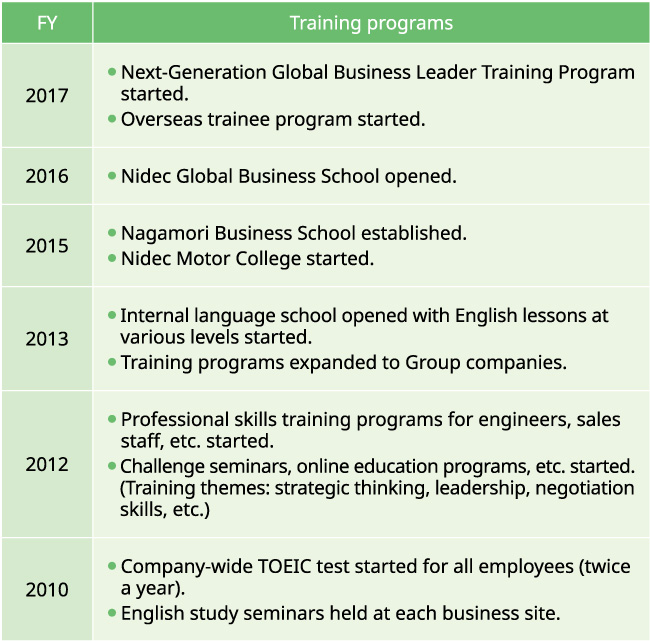
Promote diversity
Basic stance
The Nidec Group recognizes diversity as a source of com-petitiveness. In conducting businesses globally, we believe that we can effectively respond to a rapidly changing business environment and customer needs by respecting and accepting the differences among individuals and making the best use of such differences.
The Nidec Group has its development, production, sales and research sites all over the world, where diverse human resources are actively working. We are committed to hiring talented, motivated individuals regardless of their personal characteristics and values, while working to establish eval-uation and promotion systems and a working environment that allow employees to fully exercise their potential abilities.
Meanwhile, although female managers have been steadily increasing at Nidec, we are aware of the need to implement measures to improve the ratio of managerial positions held by women, and promote the active participa-tion of female directors. As the company has so far focused on developing systems and an environment contributing to the improved productivity and career development of employees, our next task is to operate and promote systems that are tailored to diverse employees. In addition, to build a foundation for the medium to long term for employees to bring the best out of themselves, enhanced efforts are required to promote the health of the employees and encourage them to autonomously think about their career paths and take action. In view of these tasks, Nidec released the plans below (non-consolidated) in March 2020.
- Raise the ratio of managerial positions held by women to 8% by FY2020, and increase the number of female directors to two or more by FY2021.
* As of the end of FY2020: 5.7% of all managerial positions held by women, three female directors - Raise the percentage of employees using one of the three systems (home working, staggered shift work, and by-the-hour annual paid days-off systems) to 40% or more by FY2022.
* As of the end of FY2020, 29%, 24% and 45% of all employees used working from home, staggered shift work and by-the-hour annual paid leave system, respectively - Raise the percentage of male employees taking childcare leave to 10% by FY2025.
* As of the end of FY2020: 9.0%
The percentage of managerial positions held by women was 5.7% at the end of FY2020, failing to reach the target of 8%. We will continue to make efforts to achieve a percentage of 8% or higher for managerial positions held by women by the end of FY2022.
Efforts to promote female empowerment
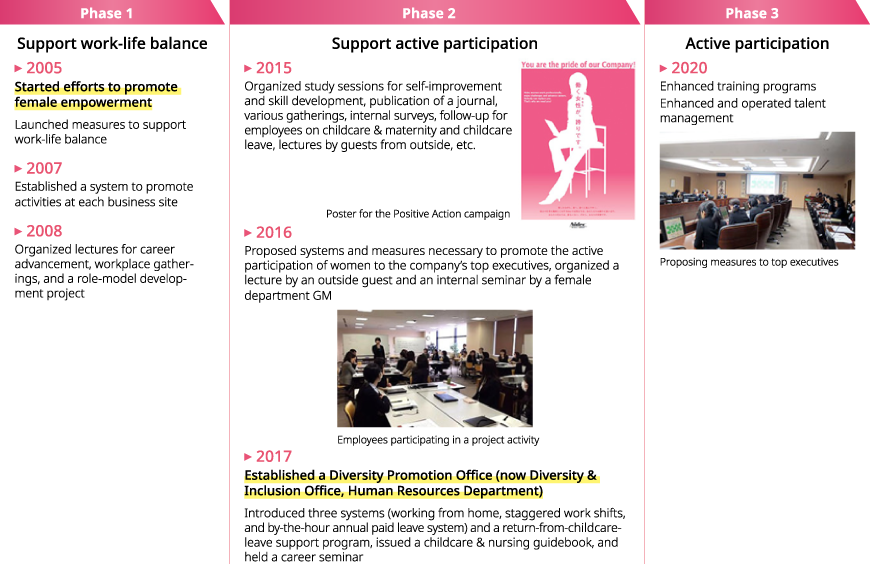
Promote occupational safety and health, and health-oriented business management
Basic stance
The declining working population is a social challenge for the world, including Japan. Companies are required to take good care of their limited labor resources by supporting the health management of individuals, and thereby help to maximize the value of their human resources. To this end, it is crucial to create a working environment where employees can be motivated and productive.
The Nidec Group declares in its CSR Charter, “Based on cooperation between our management and employees, we strive to ensure workplace safety and good health to establish a work environment that brings out the best in each individual.” Nidec’s health-oriented business management is based on the promotion of making a safe and comfortable work environment, and securing the safety and good health of its employees.
Nidec released the Declaration on Promoting Good Health in June 2020 to announce its determination to enhance “health and productivity management,” and the company was certified as an Outstanding Health and Productivity Management Organization 2021 (in the large enterprise category) by the Ministry of Economy, Trade and Industry (METI) in March 2021. In addition, Nidec has set up a cross-departmental Health Promotion Committee to enhance systems for health management and promotion, while organizing health seminars by industrial doctors and conducting a health awareness survey on all employees, with the aim of improving the health literacy of employees. Furthermore, with the aim of achieving a total smoking ban at all operation sites by the end of FY2021, Nidec is currently promoting a partial smoking ban with understanding of the importance of health and productivity management. By promoting health and productivity management, we will improve our competitiveness and corporate value.
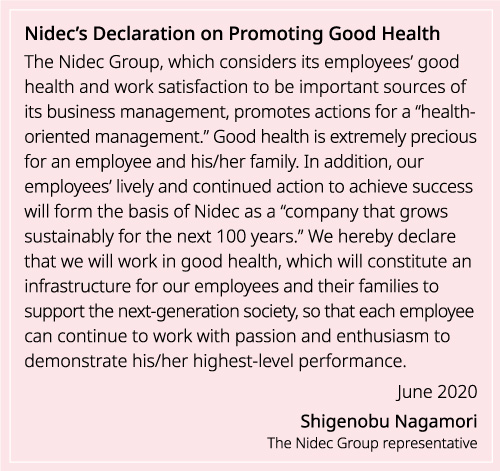
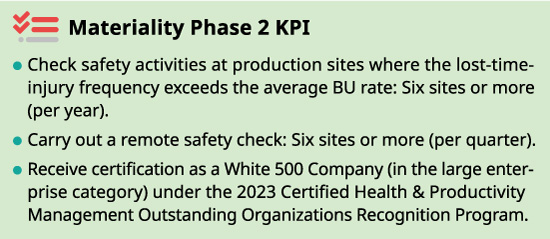
Safety
To build a safe and comfortable work environment, all group companies’ business bases, including newly built bases and those that newly joined by way of M&A, place the highest priority on the safety of their employees and promote safety activities. The Nidec sites in Japan have a safety and health committee in place to discuss measures to secure the safety of all the sites, including plants. Our goal is to maintain a safe working environment and achieve a zero lost-time injury frequency rate.
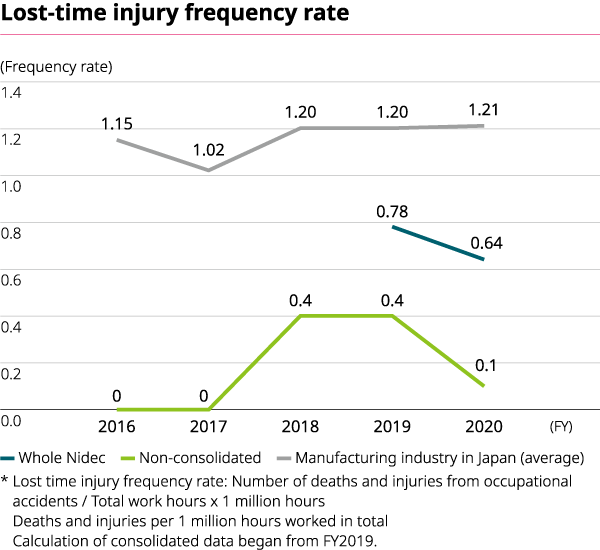
Health
Aiming to create a work environment that promotes our employees’ mental and physical health and help them shine at Nidec to the greatest extent possible, we have a Health Promotion Committee in place. Each business base has health promotion personnel to launch measures tailored to its workplace, while working in collaboration with industrial doctors, i.e., health experts, and a health insurance union for the entire company to promote health-oriented business management.
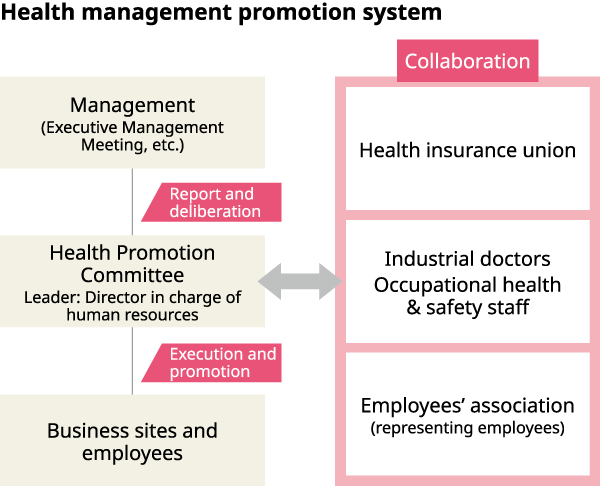
Response to COVID-19
Nidec considers ensuring the safety of its employees and business partners as its highest priority, and is committed to the continuous provision of products and services, while striving to prevent the transmission of COVID-19 inside and outside of the company. In January 2020, Nidec set up a crisis management headquarters to organize the procedure in the event that infection occurs, formulate and implement measures to prevent infection within its business sites, and establish policies according to the medical system and infection status of each country. The company encouraged employees to make full use of the work-from-home and staggered work shift systems as measures to prevent infection. To minimize the impact in the case of infection, zoning of business sites, temporary closure of cafeterias, and strict control of individuals who may have contact with an infected person and other measures are also flexibly employed according to the situation. Also, workplace vaccination is provided for employees in Japan and their family members, thereby ensuring a workplace environment where employees can feel safe in fulfilling their duties. Amid the expected “with COVID” environment, the Nidec Group will continue to take concerted action promptly and appropriately in cooperation with all relevant parties.
Respect human rights and follow proper labor practices
Basic stance
Recognizing the importance of considering human rights in global business environments, Nidec upholds international guidelines such as the UN Guiding Principles on Business and Human Rights, the UN Global Compact, the UN Universal Declaration of Human Rights, and the ILO Declaration on Fundamental Principles and Rights at Work in response to diversifying human rights-related issues. The Nidec Group CSR Charter provides for respect for human rights, while the Nidec Group Declaration on CSR Conduct, which comple-ments the CSR Charter, prohibits forced labor, child labor, and discrimination and inhumane treatment, and guarantees proper wages, work hours, non-work days, leaves, freedom of association, and the right to collective bargaining.
At present, the Nidec Group has over 300 operation sites in 43 countries and regions, as well as several times that number of business partners supporting our business activities in each country/region. Many of the key plants and their supplier plants are operating in countries where the legal systems to protect human rights are said to be insufficient. Most of the labor and ethical problems arising at workplaces these days are said to be attributable to inadequate management of human rights. It is important for companies to be aware that they are responsible for not only human rights issues inside their business sites, but also labor and ethical issues arising in their supply chains. As a company conducting business activities across various countries, religions, customs and cultural values, the Nidec Group recognizes its role to uphold policies at the head office and take the initiative, and has set as a KPI: Clarify human rights policies for workers including those in the supply chain, and spread them among employees. We are determined to fulfill our responsibility in respecting human rights, and advance efforts to create safe and secure work-places where diverse human resources can play active roles.

Specific actions
The Nidec Group’s human rights-related risk assessment is focused primarily on Asia, where more than 70% of its employees operate. In partnership with a third-party certification organization, we regularly implement audits at our major factories in Asia, using the set of standards substantially equivalent to the RBA Code of Conduct.* The audit encompasses the seven essential dimensions of human rights, including at-will employment, child/young labor, and work hours.
* RBA (Responsible Business Alliance) is an organization established for the purpose of solving social, environmental and ethical issues in the supply chains of the electronics industry.

